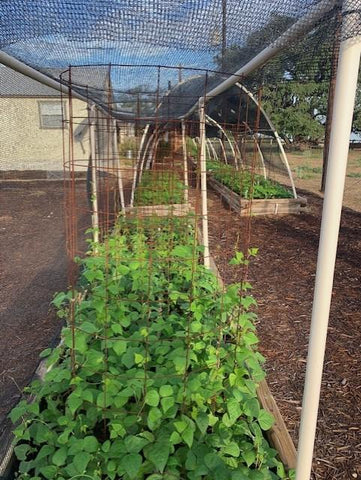The Ultimate Guide to Farmer's Markets
Are you looking to support local farmers and artisans while enjoying fresh, seasonal produce? Look no further than your local farmer's market! In this ultimate guide, we will explore everything you need to know about farmer's markets.
What are Farmer's Markets?
Farmer's markets are community markets where local farmers, growers, and artisans come together to sell their products directly to consumers. These markets offer a wide variety of fresh produce, meats, dairy products, baked goods, and handmade crafts.
Benefits of Shopping at Farmer's Markets
Shopping at farmer's markets has numerous benefits. Not only do you get access to fresh, seasonal produce, but you also support local farmers and artisans. By cutting out the middleman, you can often find high-quality products at lower prices. Additionally, shopping at farmer's markets helps reduce your carbon footprint by decreasing the distance your food travels.
How to Make the Most of Your Farmer's Market Visit
Plan your visit by checking the market's schedule and location. Arrive early for the best selection, and don't forget to bring reusable bags to carry your purchases. Take the time to talk to the vendors, ask questions about their products, and learn about where your food comes from.
Tips for a Successful Farmer's Market Trip
Make a list of what you need to avoid impulse purchases. Bring cash, as some vendors may not accept credit cards. Be open to trying new fruits and vegetables that you may not find in a traditional grocery store. And finally, enjoy the experience of shopping outdoors and connecting with your community.
Supporting Local Agriculture
By shopping at farmer's markets, you are directly supporting local agriculture and helping to preserve farmland in your community. Your purchases help small-scale farmers stay in business and continue to provide fresh, healthy food for you and your family.
Next time you're looking for the freshest produce and unique artisanal products, be sure to visit your local farmer's market. Not only will you enjoy the benefits of fresh, seasonal food, but you'll also be supporting your local community and economy.
Farmers' Market. What comes to mind when you hear these words?

Fresh food grown on a small farm or in a backyard garden is what comes to my mind. It can also be a large scale farm, but most of these have contracts where they can only sell what they grow to a certain manufacturer. Many food manufacturers own the farms that grow the food they sell.
According to Wikipedia, a farmer's market is “a physical retail marketplace intended to sell foods directly by farmers to consumers. Farmers' markets may be indoors or outdoors and typically consists of booths, tables or stands where farmers sell their produce, live animals and plants, and sometimes prepared foods and beverages.”
For the purposes of this article, we will be focusing on fruits and vegetables only, based on the laws of Texas. They may be different where you are so you will need to research for your specific area.
There is nothing like slicing open and eating a home grown tomato that has been left on the vine to ripen fully. My mouth just waters thinking about it. What you buy in the stores is picked green several weeks before it is ripe.
A ripe tomato will only last a few days after it has been picked. They are picked green and before putting on the shelf they are given a chemical shower to help them turn red. This shower does nothing for the taste. It is still going to taste bad.
I have had friends over and given them a freshly picked tomato to eat. They are surprised at the taste. Salsa made with fresh tomatoes also tastes a lot better and because it is fully ripened, you do not need to add any preservatives to it.

One should be able to get fresh fruits and vegetables at a Farmer’s Market that are grown locally.
But wait. There are those who only care about getting your money. They are actually going to the wholesale produce place (which may or may not be getting produce from local farmers) and buying the fruits and vegetables. They then will take these to a farmer’s market, claim they grew them and charge twice the price one finds in a store.

I have been to several farmer’s markets to buy tomatoes only to find they tasted worse than the ones in the store and I paid about two to three times the price.
I went to church with one of these sellers. One Sunday, I asked them how their squash was doing since mine had tanked for the season. It got too hot too fast.
They told me theirs was doing great. I asked what kind of insecticide they used. They told me none. I was already suspicious of them because I had bought some tomatoes that tasted so bad we gave them to the chickens.
I knew they were selling stuff that they did not grow. Because here in South Texas, if you don’t use some sort of non-organic (organic insecticides do nothing against the squash bugs that attack squash) insecticide, you will have no squash. I went to talk to them about it. They told me to leave them alone.
So I have. But they are doing some stuff illegally. I am sure they do not understand the law. I know because we were doing it also.
The health department made us destroy thousands of dollars of product because with a commercial permit, which we had, you cannot can the same way you do under Home Cottage Laws, which we did.
At least they did not fine us, which they could have. You have to have a commercial canning process (which we did not have) and a commercial kitchen. We have the commercial kitchen.
They were claiming their product was organic. Unless you have a permit from the USDA, you cannot use the word organic or their organic symbol.
It used to be that only the person growing the organic product had to have a license. Then the USDA got smart and starting requiring that everyone having anything to do with organics, had to have a permit.
We sell a lot of organic seeds and our produce, except for the squash, is grown organically but we cannot say this. I am not going to pay $1500 a year per variety just so I can say the seeds are organic. UPDATE: Seems the rules have changed a bit. We are applying for the permit.
A lot of big seed companies no longer use the word organic on their organic stuff. If someone is claiming their product is organic, ask for their permit if you are really serious about buying organic.
Or you can check the organic data base. If they have a permit, they will be on this data base.
You have to be careful when you go to a farmer’s market since not all of those selling produce have grown it themselves.
How can you tell?
One way is to look at the produce. Is it all the same size, no blemishes or defects? All the same exact color, especially tomatoes? If it is, it is probably bought from a wholesaler.
They cannot cut anything open and let you taste it. This is against the law. You see vendors selling watermelons. They have cut some open to show you the color inside. This is against the law as well. You cannot cut anything open.
Another way to tell is to check the seller's Facebook page or other social media platforms. If they grew it, they will be proud of it and will post pictures. I do.
We are fixing to have so many bush and pole beans of green, yellow and purple, that by the time we finish harvest, snapping and storing we will be thoroughly sick of them.
We should also have some to sell. And you know that we grew them because I post pictures and my wife posts pictures. We have even put some pictures on this article.
One thing one person did, claiming their stuff was local, was go to an actual farm and take pictures, the idea being you were to think it was their farm. I don’t think they fooled anyone.
Another way is to check their social media. If they are posting pictures and saying that they are at this market and that market, 4 to 5 times a week, then they are probably not growing since you have to have some time to actually work in the garden.
And you can type their address in Google maps and see a picture of their house and yard. Is there space in their yard to grow everything they are selling? And, in some cases, like ours, you can even see their garden beds through Google.
I noticed one person selling produce. I looked up their address. I knew who they were and where they lived, and they lived in an apartment. They had no room to grow anything.
Come to find out they were going to a community garden and getting free produce, then selling it. This was definitely fraud. (We have had the same thing happen with seeds we donate. They ended up on eBay.)
Most community gardens are set up as a 501C3 Corporation so they do not have to pay any taxes and people donating to them can get some tax relief. If someone is taking the produce and selling it, then they are committing fraud. (This happens a lot with food pantries, especially with diapers. People will forge paperwork, pick up diapers and sell them at garage sells and flea markets.
The main purpose of community gardens (according to their Articles of Incorporation) is to provide free food for those who cannot afford it. This person, in my opinion, who is the vilest of people, was cheating, stealing and breaking all sorts of laws. Eventually they were caught, prosecuted and spent some time in jail.
I did not report any of these. I wanted to but did not. (Turns out I did not have to report. The person defrauding the community was arrested for embezzling from a charity. Now they are shut down completely.)
I hope this article has helped to clear up any concerns about farmers’ markets.
We give educational tours at our farm so come out and see us.
If you have any questions or would like us to check on a certain person selling at a Farmer's Market, then email me at davidsgardenseeds@outlook.com.







7jjx3w
Great article & educational. You verified my suspicions on alot of this so called vendors. I too have seen the likes of them & eventually just quit shopping those markets in San Antonio, Tx. Thanks again for the education. A proud 100% disabled veteran and Apache Warrior.
Leave a comment